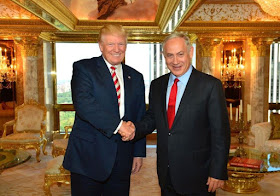“The American desire for peace between the Israelis and the Palestinians has remained unchanged for 50 years. While we don’t believe the existence of settlements is an impediment to peace, the construction of new settlements or the expansion of existing settlements beyond their current borders may not be helpful in achieving that goal. As the President has expressed many times, he hopes to achieve peace throughout the Middle East region. The Trump administration has not taken an official position on settlement activity and looks forward to continuing discussions, including with Prime Minister Netanyahu when he visits with President Trump later this month.”
The key takeaway from this short statement is:
- Israeli settlements are not an impediment to peace
- Construction of new settlements "may not be helpful" in achieving peace
- Expansion of existing settlements "may not be helpful" in achieving peace
- The Trump administration has not taken an official position on settlement activity
- Trump looks forward to discussing settlements with Netanyahyu
Seems pretty straightforward. The US is open to the construction of homes within and withholds final judgment on expansion without until Trump meets Netanyahu later in February.
And it is positive and favorable to Israel.
Until the media gets a hold of it.
According to The New York Times, President Trump unexpectedly shifted his stance on Israel, warning Prime Minister Netanyahu to hold off on settlement construction:
President Trump, who has made support for Israel a cornerstone of his foreign policy, shifted gears on Thursday and for the first time warned the government of Prime Minister Benjamin Netanyahu to hold off new settlement construction.That's a stretch.
...The statement resembled those issued routinely by previous administrations of both parties for decades, but Mr. Trump has positioned himself as an unabashed ally of Israel and until now had never questioned Mr. Netanyahu’s approach.
Yes, Trump's statement is a shift -- not a shift from his position on Israel, but a shift from previous administrations whose official policy has been that the settlements are "illegitimate," and that means that contrary to The New York Times, this statement decidedly does not "resemble" previous administrations.
The White House statement itself is a response to a tweet by the Jerusalem Post's Michael Wilner:
Exclusive: Donald Trump supports a two-state solution and is warning #Israel to cease settlement announcements. https://t.co/4AmbhR0blu— Michael Wilner (@mawilner) February 2, 2017
That tweet was followed up later by fellow Jerusalem Post reporter Yaakov Katz:
There are 3 points to keep in mind:And here we go. Now official statement by @PressSec. "Expansion of settlements...may not be helpful". Follow up to @mawilner's scoop. pic.twitter.com/FRhbpfzQ9m— Yaakov Katz (@yaakovkatz) February 2, 2017
- Israel has been building homes all along -- that is what the statement would have addressed if the intent was for Israel to stop building homes.
- Israel has not built a new settlement, despite exaggerated media reports, in 25 years
- Wilner's tweet and the Trump Administration's statement is happening against the backdrop that in response to the evacuation of Amona, Netanyahu announced his intent to build a new settlement.
At a time when for years Israeli construction of homes has been confused by the media and the Obama Administration with the building of new settlements, now the media insists that discouraging the building of new settlements for the time being is equivalent to opposing the building at homes.
In doing so, the media is sidestepping the huge significance of the Trump Administration being the first US administration to legitimize settlements and clearly state that they are not an impediment to peace.
 |
| Netanyahu met Trump in September last year. Credit: Jerusalem Post |
-----
If you found this post interesting or informative, please  it below. Thanks!
it below. Thanks!
 it below. Thanks!
it below. Thanks! 
No comments:
Post a Comment
Comments on Daled Amos are not moderated, but if they are exceedingly long, abusive, or are carbon copies that appear over half the blogosphere, they will be removed.